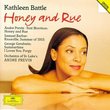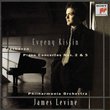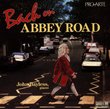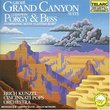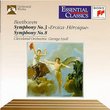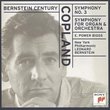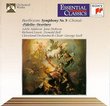| All Artists: Ludwig van Beethoven, Igor Stravinsky, Arnold Schoenberg, Carl Orff, Emil Nikolaus von Reznicek, Franz Joseph Haydn, Johannes Brahms, Hermann Scherchen, Vienna State Opera Orchestra, Royal Philharmonic Orchestra, Berlin Radio Symphony Orchestra Title: Great Conductors of the 20th Century: Hermann Scherchen Members Wishing: 0 Total Copies: 0 Label: EMI Classics Original Release Date: 1/1/2000 Re-Release Date: 11/4/2003 Genre: Classical Styles: Opera & Classical Vocal, Historical Periods, Classical (c.1770-1830), Modern, 20th, & 21st Century, Symphonies Number of Discs: 2 SwapaCD Credits: 2 UPC: 724357595629 |
Search - Ludwig van Beethoven, Igor Stravinsky, Arnold Schoenberg :: Great Conductors of the 20th Century: Hermann Scherchen
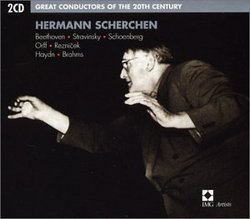 | Ludwig van Beethoven, Igor Stravinsky, Arnold Schoenberg Great Conductors of the 20th Century: Hermann Scherchen Genre: Classical
|
Larger Image |
CD DetailsSimilarly Requested CDs
|
CD ReviewsSurprising repertoire for a great "modern music" conductor Louis Lee | Princeton, NJ United States | 01/13/2004 (5 out of 5 stars) "Hermann Scherchen was probably the most celebrated advocate of modern music of the 20th century - from his early days playing Mahler in Berlin to building his modern music lab in Gravesano in the last years of his life. He premiered many important "modern" pieces, including those by Berg and Schoenberg. It is therefore extremely shocking that this tribute contains mostly "main stream" repertoire, with the Schoenberg piece "Suite in the old style"!That said, don't take away the merits of this wonderful set. As a "classical music" conductor Scherchen is always full of insight and always controversial: extreme tempi, incredible rubati, and so on. So much to the extent that Schoenberg once said with him there's never a dull moment - he's always interesting even when he puts things horribly wrong! His Mahler 9th on Orfeo d'Or no doubt falls neatly into that category, but this set certainly represents Scherchen at his best. The celebrated Beethoven 8th is now in its third reincarnation (the first one being an MCA double-decker and the second a single budget MCA-disc paired with a crazily speedy yet effective 6th), and the remastering has much to commend. The Firebird Suite is simply stunning: Scherchen's touch on its rhythm shines like no other. I suspect why the set includes the Haydn symphony is that Scherchen used to make tonnes of Haydn recordings for Westminster, and was fairly representative of his recording work during that era (1950s). The Brahms one was the real surprise package, though: absolutely thrilling with pulsating tempi. Highly recommended." Scherchen, the wild man in the room, doesn't disappoint Santa Fe Listener | Santa Fe, NM USA | 12/29/2005 (4 out of 5 stars) "The problem with Hermann Scherchen is also the great thing about him: his unpredictability and crazily reckless decisions. We hear this in practically every note of these two CDs in the Great Conductors series. Balances can be wildly off, tempos helter-skelter, ensemble thrown out the window (and the compilers by no means picked the worst of Scherchen's many recordings for Westminster, which can be so ragged as to be unlistenable). But Scherchen was much more than a lovable maniac; he is never less than gripping.
CD 1 begins with a slapdash, exciting Coriolan Overture (good mono, 1954) with the Vienna State Opera Orch. Technically this orchestra is supposed to be some version of the Vienna Philharmonic, but during the early Fifties at least they sounded like a ragtag pickup band. Ensemble and sound improve markedly with the Beethoven Eighth (mono, 1954) which curiously took 13 days to record with the Royal Phil., Beehcam's orchestra. Tempos are fast and alert, and there is no time for digging deep. Scherchen makes this symphony into an exciting race that you either join or walk away from. There's not much middle ground. (The piece lends itself well to his approach, something I can't say for his equally breakneck Eroica.) At these speeds we have room for a lot more. A Firebird Suite (mono, 1954) comes from the same sessions as the Beethoven, oddly enough. It's full of the same racing excitement. Schonberg's Suite for String Orch. is a bizarrely conventional tonal work, but being mature Schonberg it's full of modernist touches that Scherchen expertly highlights for us in a live performance with the Berlin Radio Sym.--this is one of the best things in the set (stereo, 1959). CD 1 ends with a short work totally unknown to me, Orff's Entrada (stereo, 1960), which sounds like Baroque pastische a la Respighi's Ancient Airs and Dances. It loses its fake achaic charm long before eight min. are up. CD 2 starts off with a burst of champagne, Resnicek's Donna Diana Over. (stereo, 1957). For once the Vienna State Opera Orch. actually sounds like it's from Vienna, and things couldn't be better. The same group is reasonably up to scratch in Haydn's 'Military' Sym. #100, though the 1958 stereo sonics make them sound a scrawny. Haydn was Scherchen's least eccentric composer, at least until we get to the breakneck finale, which is something else again--Beecham on amphetamines. With more robust forces the VSOO takes on the Brahms First (mono, 1952), which Scherchen dispatches in 41 min., equal to Toscanini's NBC Sym. recording from the same period. Hiss rocket-propelled finale will leave you agog. The dated sonics make the strings sound wiry and buzzy, but this is an energetic, well shaped reading, and recognizably similar to many others from mainstream conductors. Too bad we didn't get something more modernist or at least a taste of Scherchen's hair-raising Mahler and Liszt. Anyway, what we do get is a fair portrait of this one-of-a-kind conductor, who deserves a lot more exploration by anyone who gets a tempting taste of what he could do. CD 2" |

 Track Listings (15) - Disc #1
Track Listings (15) - Disc #1